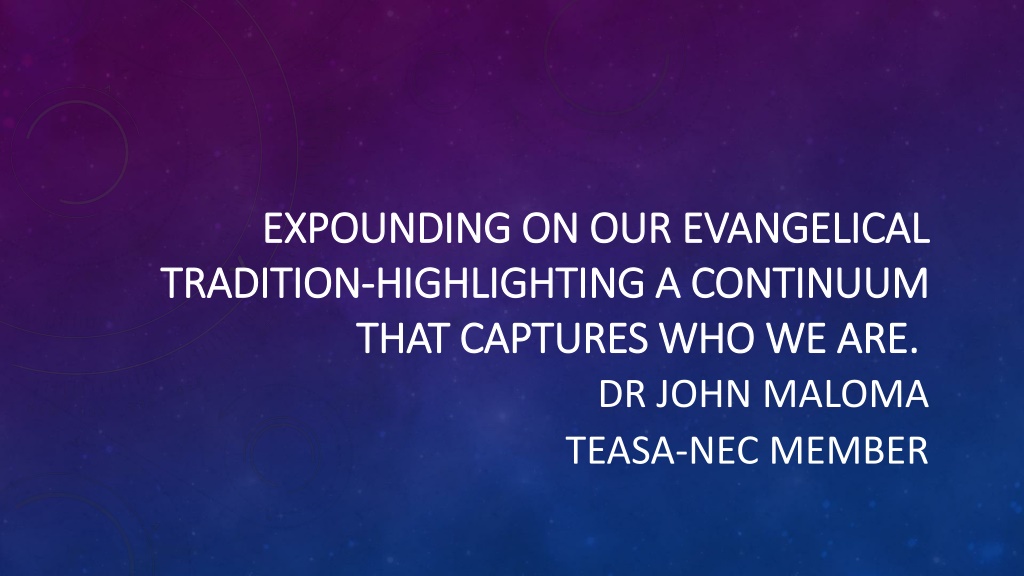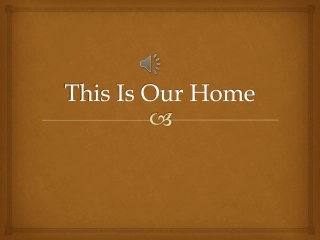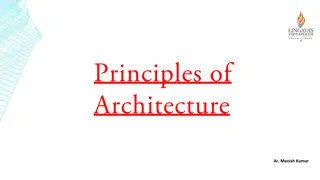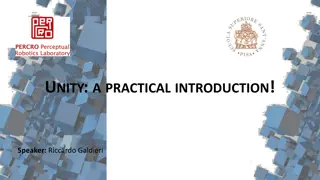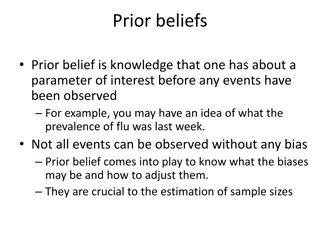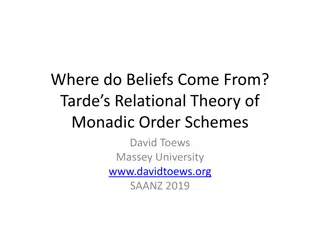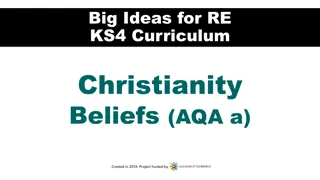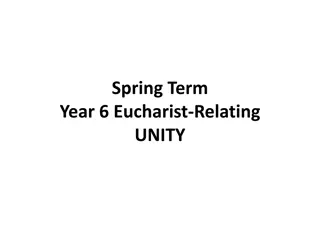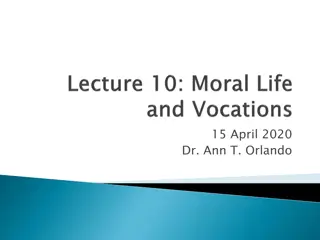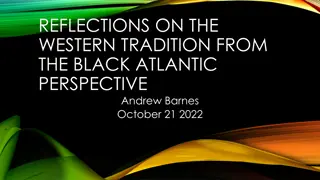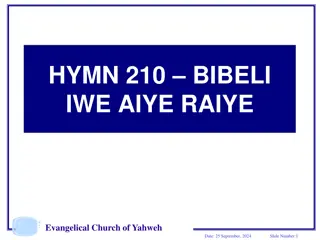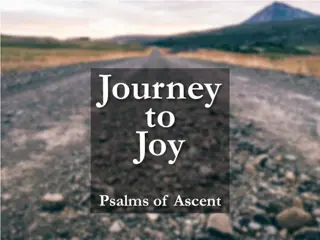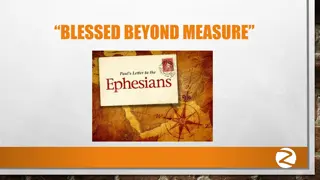Exploring Our Evangelical Tradition: A Continuum of Beliefs and Unity
This insightful discussion delves into the rich history and diverse facets of evangelicalism, highlighting its biblical roots, historical evolution, and contemporary relevance. From the foundational teachings of Jesus to the varying political landscapes influencing its expression, the nuanced spectrum of evangelical beliefs is explored with the aim of fostering unity amidst diversity within the evangelical community.
Download Presentation

Please find below an Image/Link to download the presentation.
The content on the website is provided AS IS for your information and personal use only. It may not be sold, licensed, or shared on other websites without obtaining consent from the author. Download presentation by click this link. If you encounter any issues during the download, it is possible that the publisher has removed the file from their server.
E N D
Presentation Transcript
EXPOUNDING ON OUR EVANGELICAL EXPOUNDING ON OUR EVANGELICAL TRADITION TRADITION- -HIGHLIGHTING A CONTINUUM HIGHLIGHTING A CONTINUUM THAT CAPTURES WHO WE ARE. THAT CAPTURES WHO WE ARE. DR JOHN MALOMA TEASA-NEC MEMBER
OVERVIEW 1. My brief personal story 2. Introduction Trumpism Zumaism Evangelicalism is broad and all encompassing Objective of this conversation 3. Biblical basis for the Evangel. Jesus and the Good News The apostles and the Good News 4. Agreement and ambiguity
REVIEW-CONTINUED The first century followers of Christ When did Christ followers became known as Evangelicals The dawn of new expressions of Evangelicalism Billy Graham and his crusades The cracks that began to manifest 5. Conclusion Broad issues that divides the evangelicals Pre-view of the next topics
1. MY PERSONAL STORY Fruit salad of everything Evangelical
2. INTRODUCTION Trumpism and The American Evangelicalism/SA Zumaism and the SA Evangelicalism Evangelicals are broad-Evangelicals are most known for advocating the gospel of free markets, strong defense, and traditional morals. To the watching public, evangelicals seem to share the same one view on any given issue. We self-described evangelicals often decry such stunted descriptions. Evangelicalism predates the Religious Right and represents a variety of political views, even if many now vote Republican in America and ANC in South Africa. Besides, evangelicals are not so much political activists as ambassadors for the kingdom of heaven, where Jesus Christ reigns and sustains the world. We will gladly assert that an evangelical testifies to the evangel, the good news that the one and only Son of God has come into the world to save sinners. We pass along a message of first importance: that Christ died for our sins according to the Scriptures, that he was buried, that he was raised on the third day according to the Scriptures (1 Cor. 15: 3-4).
2. INTRODUCTION-CONTINUED Yet all is not so clear within the evangelical camp either. Simply labeling we evangelical no longer suffices. We are conservative, progressive, post conservative, and pre-progressive evangelicals. We are traditional, creedal, biblical, pietistic, anti-creedal, ecumenical, and fundamentalist. Whatever their differences, evangelicals pledge allegiance to Christ alone, the only hope for self-absorbed sinners in any age or place, any stage or race. At its best, evangelicalism overcomes nonessential differences to unite like-minded Christians around the common cause of gospel proclamation and gospel living. If we lose evangelicalism to political captivity or rampage individualism, we lose a rare opportunity to demonstrate unity and mission outside the local church. The objective of this conversation-One hopes that this article, then, will serve to promote evangelicalism by highlighting common beliefs and fostering respectful disagreement where necessary. I am also writing to both the clergy and non-clergy leaders with the view to inform and create discussion about our rich evangelical tradition and movement. This forms part of a five-part series that will cover the whole spectrum of broad evangelical branches, namely; fundamentalism, confessional evangelicalism, generic evangelicalism, and post-conservative evangelicalism.
3. BIBLICAL BASIS FOR THE EVANGEL. Jesus and the Good News-Evangelicals take their name from the koine Greek word euangelion, translated into English as good news. The word appears in Scripture with various nuances. But it frequently relates to the coming of Christ and his ministry to usher in the kingdom of God. An angel announced to shepherds outside Bethlehem the good news of great joy for all people. In a message particularly rich in biblical significance for Jews, the angel explained that a Saviour was born in the city of David who was Christ the Lord (Luke 2: 10-11). At the beginning of his ministry in Galilee, Jesus proclaimed the good news of God. The time has come, he said. The kingdom of God has come near. Repent and believe the good news! (Mark 1:15). Reading from Isaiah 61:1-2 in his hometown Nazareth synagogue, Jesus taught he had fulfilled the prophet s words: The Spirit of the Lord is on me, because he has anointed me to preach good news to the poor. He has sent me to proclaim freedom for the prisoners and recovery of sight for the blind, to set the oppressed free, to proclaim the year of the Lord s favour (Luke 4: 18-19). He reiterated to followers of John the Baptist who wanted to know if Jesus was the one who is to come (Luke 7:19). Indeed, Jesus testified that he is the Messiah who accords with prophecies proclaiming the coming of God s kingdom. He responded, Go back and report to John what you have seen and heard: The blind receive sight, the lame walk, those who have leprosy are cleansed, the deaf hear, the dead are raised, and the good news is proclaimed to the poor (v. 22;cf. Matt. 11:5).
The apostles and the Good News-Still today evangelicals bear this good news that Jesus Christ has fulfilled the messianic hopes of Israel, even if his followers did not expect him to submit to crucifixion and rise from the dead on the third day. Indeed, the first disciples eventually understood that these unexpected events only confirmed that the heavenly kingdom had dawned in Jesus. As the world awaits his second coming, we have the responsibility to repent of our sins and believe this good news. Amid much debate, the apostles began taking this good news that Jesus is the Christ to the nations (Acts 5:42). Philip evangelised an Ethiopian eunuch by explaining Isaiah 53:7-8, which gives particular attention to Jesus crucifixion. He was led like a sheep to the slaughter, and as a lamb before its shearer is silent, so he did not open his mouth (Acts 8:32). The good news is that all who trust in this sacrifice for their sins have peace through Christ, who is Lord of all (Acts 10:36). No longer should we trust in the worthless idols made by human hands. Rather we may trust in Jesus, who is the exact representation of the living God, who made the heavens and the earth and the sea and everything in them (Acts 14:15). Though unbelievers accuse us of mindless babbling, evangelicals understand that Jesus resurrection is the only sure ground for hope (Acts 17:18). How beautiful are the feet of those who bear this good news, who proclaim peace, who bring good tidings, who proclaim salvation, who say to Zion, Your God reigns! (Rom. 10:15; Isa. 52:7).
Evangelicals take criticism for adopting an essentially a negative posture toward what the world regards as progress. It is true that evangelicals will side with Scripture when others bless moral behaviour that God condemns. And the good news carries an initial bit of bad news that sin has broken the relationship between God and his creation. But evangelicals bear in their very name a message of the greatest joy imaginable. Though they sin, humans may be reconciled with their perfectly holy, perfectly powerful, perfectly loving Father. Through Jesus Christ, the Father adopts believers into his everlasting family, not based on anything they have done to earn his favour, but purely by his pleasure and will (Eph. 1:15). Wherever you may find them, whatever language they speak, evangelicals will gladly share this good news, the best news ever delivered.
4. 4. AGREEMENT AND AMBIGUITY The first century followers of Christ-Jesus first followers did not go by any one name in the New Testament. Those who were Jews did not feel compelled to adopt a new name, believing that Jesus Christ fulfilled the promises given to their forefathers. Persecutors, including Saul, pursued members of this group that became popularly known as the Way (Acts 9:2). Though ambiguous, the term was flexible enough to carry several meanings. Jesus had described himself as the way and the truth and the life (John 14:6). So, it is possible that these followers of Jesus Christ were known for pointing the way to fellowship with the Father through his Son. Later, adopting the Greek term for the Hebrew Messiah, Jesus disciples were first known as Christians at Antioch (Acts 11:26). When did Christ followers became known as Evangelicals-Even though the Bible has much to say about the gospel, Christians did not begin calling themselves evangelical until the Reformation of the sixteenth century. Martin Luther, a pious, earnest German monk, underwent what his biographer Roland Bainton described as an evangelical experience while teaching the Psalms and epistles to the Galatians and Romans between 1513 and 1517. These studies proved to be for Luther the Damascus road, Bainton wrote, referring to Saul s unexpected conversion after encountering the risen Jesus (Acts 9).
While pouring over these biblical texts, Luther read good news that he believed contemporary Roman Catholic teaching had obscured. He previously resented a God he understood as Just and angry. But while dwelling on Romans 1:17, Luther suddenly understood that the justice of God is the righteousness by which through grace and sheer mercy God justifies us through faith. Luther felt as though he had been born again. The Scripture he had studied for so long took on a new meaning. If you have a true faith that Christ is your Saviour, then at once you have a gracious God, for faith leads you in and opens up God s heart and will, that you should see pure grace and overflowing love, Luther wrote. He who sees God as angry does not see him rightly but looks only on a curtain, as if a dark cloud had been drawn across his face. Luther and other Reformers who criticized the Roman catholic Church came to be known as evangelicals. To this day, Lutherans incorporate this term in their official titles, even if their usage more closely corresponds to the English term Protestant. But Luther protested Roman Catholic practice and theology out of concern for the biblical gospel. So evangelical captures the appeal of the Reformers message and the beliefs that united them in a way that the negative Protestant does not.
The dawn of new expressions of Evangelicalism-Throughout the eighteenth and especially the nineteenth century, European skeptical biblical scholarship made inroads among American ministers and other church leaders. Scholars from Luther s native Germany in particular, employed critical tools to cast doubt on the veracity of events recorded in Scripture. The so-called higher criticism changed the complexion of several American denominations. By the early twentieth century, many Protestants who defended the Bible felt besieged. Schools such as Princeton Seminary, once a bastion of conservative orthodoxy, was reorganized in 1929 to include scholars who professed diverse beliefs about the Bible s authority and trustworthiness. Denominations such as the Methodist Episcopal Church, which had grown so rapidly in the nineteenth century through the tireless work of evangelists, now seemed more interested in advancing social causes such as prohibition. Amid these challenges, Christians united across denominational lines to reassert their belief in the fundamentals of the faith, including the veracity of biblical miracles such as the virgin birth and resurrection of Jesus. Some newer evangelical expressions, particularly Pentecostalism, thrived during the tumultuous years before World War II. But many evangelicals, now popularly known as fundamentalists, assumed a defensive posture that alienated them from the era s crucial debates over theology and social issues. By the time World War II ended in 1945, a younger generation including Harold John Ockenga agitated to reengage Western society on several fronts. Adapting an earlier term, Ockenga described this movement as neo-evangelicalism. These evangelicals would retain much fundamentalist theology and prioritise evangelism while building broader coalitions to apply the gospel to contemporary social concerns.
Billy Graham and his crusades-Thousands turned up to hear evangelists such as Billy Graham during Youth for Christ rallies. Ockenga s native Boston hosted Graham in 1950 for an evangelistic crusade that recalled George Whitefield s visit at the dawn of the First Great Awakening in 1740. Yet by 1957, the nascent movement splintered, a divide that continues today as will be described in this series. Graham s relationship with self-described fundamentalists such as Bob Jones Sr., who once saw so much promise in the young evangelist s career, was already strained before he allied with the liberal Protestant Council of the City of New York for a 1957 crusade. But this decision led to a decisive break between the new evangelicals and fundamentalists. The cracks that began to manifest-It was not long before other cracks began showing in the evangelical ranks. Even as he continued to minister in Boston, Ockenga commuted to Pasadena, Carlifonia, where he served as president for the flagship evangelical graduate school, Fuller Theological Seminary, founded in 1947. Daniel Fuller, son of the seminary s founder and who would become dean in 1963, argued to Ockenga in December 1962 that the Bible includes historical and scientific mistakes. His view carried the day as the seminary backed away from inerrancy, prompting several faculty members to leave. Despite the efforts of Ockenga, Graham, Henry, and others to forge unity through parachurch organisations, evangelicalism was tugged in sometimes competing directions.
While insiders foresaw looming problems, the watching public was just noticing a resurgent evangelicalism. Graham continued to attract large crowds, but it took a peanut butter farmer from Georgia to convince mainstream media to recognize the broader evangelical movement. Jimmy carter s candidacy sent journalists on a hunt to understand what he meant by saying he was born again. As Carter matched on to victory over President Gerald Ford, Newsweek declared 1976 The Year of Evangelicals. Despite the positive press, controversy continued to flare within the camp. Harold Lindsell, a former Fuller faculty member who succeeded Henry as editor of Christianity Today, scorched Fuller with his book The Battle for the Bible. But even some of his closest allies chided Lindsell for making inerrancy a litmus test for evangelicalism.
5. CONCLUSION Broad issues that divides the evangelicals-Looking back, we can see that evangelicalism has continued to shape public discourse, especially in the political realm. Evangelicals unite across theological lines for cooperative evangelism and social activism. Institutions founded during the post war period, including Fuller Theological Seminary and Christianity Today, endure. But so, do the disputes over authority. Evangelicals recognize that Scripture trumps every human authority, yet they do not agree on the extent and nature of biblical authority. They do not regard every theological issue as equally clear-cut or crucial, yet they do not agree on which doctrines should be of first importance. Other issues have likewise exposed evangelical division. That God knows, and even plans the future is a matter of fundamental conviction to many evangelicals. Yet other theologians who have described themselves as evangelical, including John Sanders, Clark Pinnock, and Greg Boyd, have said that fidelity to Scripture compels them to believe that no one, including God, can know what has not yet happened. They argue that God is partly open to a future of possibilities contingent on our prayers and decisions. Likewise, many evangelicals believe that any gospel presentation that excludes the good news that Christ endured God s wrath as a substitute for sinners does not explain the gospel at all. Yet other theories propose to explain Christ s work on the cross, such as the belief that his primary triumph was to liberate sinners from evil. Is there any one privileged theory of the atonement? Or only many such theories? Do any of these theories fail to match the biblical evidence? Any gospel description depends on one s answers to these questions.
In this series an attempt will be made to highlight and summarise the four contributors of the four main branches of evangelicalism, namely, Kevin Bauder (Fundamentalism), Albert Mohler Jr (confessional evangelicalism), John Stackhouse Jr. (generic evangelicalism) and Roger Olson (postconservative evangelicalism). May God bless us with conviction and courage and count us worthy of his calling (2 Thess. 1:11).
SOURCES 1. Gundry, A.D; Hansen, C. General editors. The Spectrum of Evangelicalism: Zondervan, 2011 2. Roland H. Bainton, Here I Stand: A life of Martin Luther (New York: Meridian, 1955), 45=50 3. Carl F. Henry, The Uneasy Conscience of Modern Fundamentalism (Grand rapids: Eerdmans, 1947) 4. George Marsden, Reforming fundamentalism: Fuller seminary and the News Evangelicalism. (Grand Rapids: Eerdmans, 1995).
